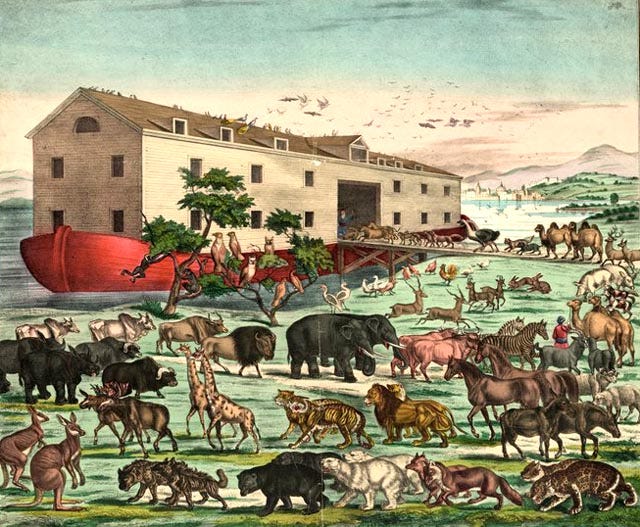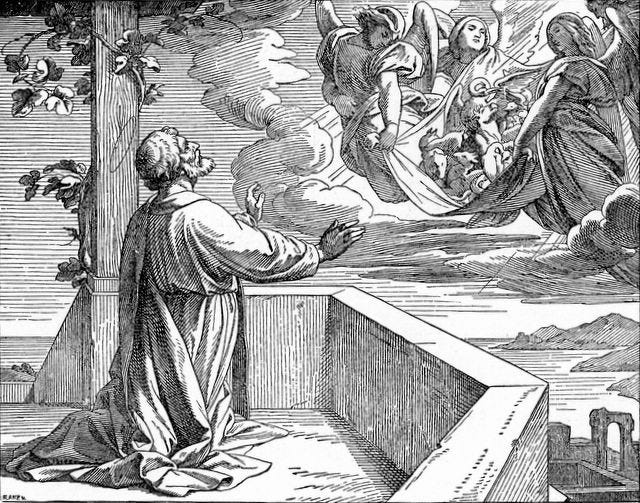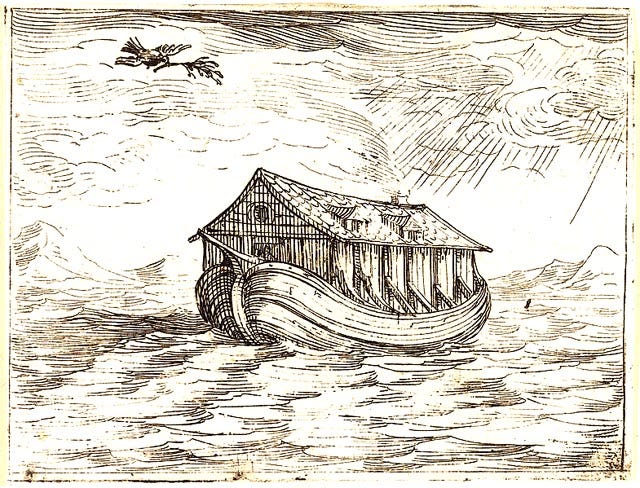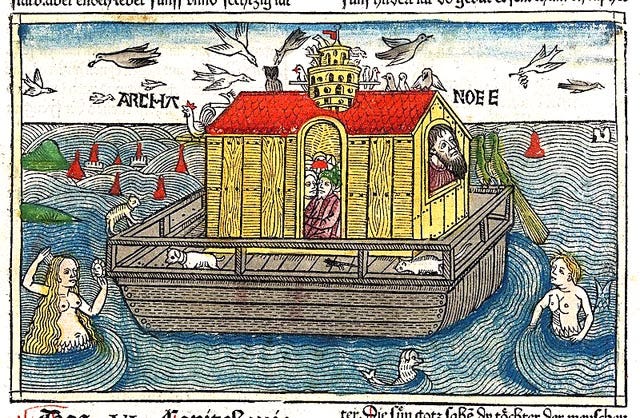Genesis 7: The Great Flood Begins
"All the fountains of the great deep were broken up, and the windows of heaven were opened..."
Okay, I get the importance of repetition in storytelling, especially in stories that began as oral tradition.
But I'm sorry, this chapter just looks like it had crappy editing. Maybe I'm just in a mood. (And who wouldn't be after contemplating the destruction of almost every living thing on the planet? The First Mass Extinction.)
Anyway, here's the story.
The Story

Noah's ark and the general deluge (Wikipedia) The winners of the Ark Lottery.
The god reaffirms his confidence in Noah's goodness, and again gives instructions. But this time, instead of two of every animal, the god specifies that some animals, designated "clean" by some standard never before explained, should be saved in seven pairs (or perhaps seven units in total), not just one. Birds, too--all birds--will have seven pairs (or units) saved (despite what the god had said in Chapter 6).
He then told Noah that the rain would commence in a week, and would last for nearly six, and that "every living thing" he would "destroy" (with, as we shall see, some common-sense exceptions).
Noah was 600 (!) when the flood struck; he got the animals in, and the predicted disaster struck, and it rained upon the earth for forty days and forty nights. And the god shut the door of the ark. Ultimately, all the hills and mountains were covered under "fifteen cubits" of water, which stuck around for five months.
Everything that breathed air through its nostrils was dead.
The Skeptics' Delight
As I mentioned, a strong editorial hand might have made something of this chapter, but as it stands, it's a mess.
Let me assume that you, dear reader, are also a good reader. I'll ask you a series of questions, which you must answer based solely on the text offered here. No Cliffs Notes!
Question 1. Which animals are clean, and which unclean?

In which the Apostle Peter is shown that all this clean/unclean stuff is balderdash (Wikipedia) (See Acts 10)
If you have to go to Leviticus to find out, you're committing an anachronism. The Law ("of Moses") simply hadn't been given yet. Everyone knows that observant Jews (and Muslims) don't eat pork, and you may know about the shellfish prohibition (but do you know why?). But the menu of "unclean" animals offered in Leviticus goes way beyond these, including some animals we now eat (e.g. rabbit) and a lot that we still generally don't (rat, anyone?). Also, despite what seems to be implied in this chapter, there are many "unclean" birds: eagles, vultures, hawks, owls, ospreys, storks, herons, and bats. (Bats? The god didn't know that bats weren't birds?)
Anyway, we're getting ahead of ourselves. We'll pin all this down when we get to Leviticus 11.
Incidentally, it seems that at the end of Chapter 6, the god said take two of all animals; then he says "seven [pairs?] of the clean"; then says "two and two" again (in 7:15); it's a hopeless mess. Dr. Scofield points out that Noah was 500 when his sons were born (all at the same time? Triplets?) as we see in 5:32, and 600 years old now. Did the god forget in that hundred years that he had said two animals, not seven (or fourteen)?
Question 2. How many times did Noah and his family (and the beastly winners of the Ark Lottery) enter the ark?
I'm seeing three:
7:1 "come into the ark"
7:7 [they] went into the ark
7:13 [they] entered into the ark
Okay, 7:1 may be a command not immediately followed; but lots happened between then and 7:7, and still more before 7:13. I don't see this as a "contradiction," as the Skeptics do, but just as pee-poor editing.

Jacques Callot (1592-1635), Noah's Ark (Wikipedia) Ignore the bird; we'll meet her next time.
Question 3. How old was Noah when the Flood hit the fan (so to speak)?
Am I quibbling? Maybe. But 7:6 says, "Noah was six hundred years old when the flood of waters came upon the earth." Then 7:11 says, "In the six hundredth year of Noah's life, in the second month, on the seventeenth day of the month, all the fountains of the great deep were broken up, and the windows of heaven were opened."
Does this mean "in the second month, on the seventeenth day" of Noah's 600th year, as it seems to? Or just, like, February 17th? But the far more colloquial Living Bible says "He was 600 years old when the flood came" and then "when Noah was 600 years, two months, and seventeen days old..."
That's over a fifth of a year's difference between the two. Oh, sure, I say I'm 65, when I'm really 65, 1 month, and 12 days--over a tenth of a year past 65. But why be specific in one verse, but not in the other? At the very least it's confusing.
Question 4. Which "living things" died?
Was it:
"every living thing" that the god had made? (7:4) That would include fish, plants, microbes, and whatnot.
"all flesh"? (7:21) This would exclude plants.
"all in whose nostrils was the breath of life, of all that was in the dry land." (7:22) This would exclude aquatic animals, as well as plants, microbes, etc. And maybe insects (do they have nostrils?) (Why would fish be spared? Were they more righteous than aardvarks? But see "Why Did So Many Have to Die?" below.)
"every living substance"? (7:23) Seems we're back to including fish, plants, and microbes again.
Hopeless.
Question 5. Could this have been a local flood, or was it global?
A common argument for the historicity of the Great Flood claims that it was merely a local occurrence, a combination (one savvy commentator suggests) of a tsunami up the Tigris and Euphrates valleys combined with torrential rains.
But the god says he will destroy every living thing "from the face of the earth" in 7:4, and the phrase "upon the earth" is used in reference to water (rain, flood, rain) seven times in the account--never "upon part of the earth." Also, "the high hills, that were under the whole heaven, were covered."The whole heaven.
Incidentally, if it were indeed global, where did the water come from? As I read 7:20, we're told that the water rose fifteen cubits (22.5 feet, given an 18-inch cubit) above the tops of the mountains. Mount Everest is 29,029 feet; add 23 (rounding up) and we get that the entire earth was covered to a depth of 29,052 feet (at sea level)! There just ain't that much water in the whole world!
Moving on…
Why Did So Many Have to Die?
Okay, I'm going to go gentle on the whole question of logistics here, which I partially addressed in the previous lesson.
But here is my one, unanswerable question to those who believe that this is a literal, historic account of an event that really really happened: Why did so many have to die? It's the proverbial (pair of) elephants in the room.
Let's start with the animals. I've been a vegetarian for over a quarter of a century, based partly on my conviction that innocent animals ought not to die for my pleasure.
Innocent animals. If the god was destroying the earth for the wickedness of the humans, why did the animals have to die? What did they do that wasn't the consequence of the nature that he gave them? Even my imperfect self sees no need to slaughter the innocents. How did they sin?
Now, about the humans. Let it be stipulated that every single human being on the planet had committed crimes worthy of the death penalty, which seems extremely unlikely. (And isn't it convenient for the seven with Noah that they also weren't "voted off the island"?).
But think back to an earlier lesson. Is there anybody else who committed a sin so grievous that it demanded capital punishment?
Yeah, that's right. If he wanted a reboot, why didn't the god just kill Adam and Eve and start over? Isn't two deaths better than (presumably) thousands (but see below for a greater number)?
Alright, I'm ranting. But let me push this just a little farther. I am going to commit a fallacy of which I have often accused the True Believers. I am going to access the New Testament to explicate the "Old" as though it were one seamless narrative.
In Luke Chapter 11, Jesus says (in the New International Version), "Which of you fathers, if your son asks for a fish, will give him a snake instead? Or if he asks for an egg, will give him a scorpion?" If this "God is love" as the NT says elsewhere, how could he do such a thing? "Which of you fathers, if your son committed murder, would wipe out him and his family? Or if a preponderance of people in a city were wicked (whatever that means) would wipe out the entire populace, guilty and innocent alike?"
If one did not believe in God, but were only dealing with "the god" in this story, would one find that character admirable? Or even tolerable?
Revert to Metaphor

A woodcut of Noah's Ark from Anton Koberger's German Bible (Wikipedia) Glad to see the mermaids survived.
And so the only way I can find this story acceptable is to read it as an extended allegory: When something is dirty, wash it. When a person is a sinner, he should get baptized. When the human world is corrupt to its core, turn the whole world upside down and shake it like an Etch A Sketch and start your drawing over. Ya know, plants can drown, too, and land can be re-formed by massive amounts of water. The earth would be practically "without form, and void" again!
The alternative is just too terrible. Think about it: We're in the middle of a pandemic. Shutdowns have hit everything from airlines to beauty parlors. Kids are out of school; many adults are out of work. And why? Because, as of this writing, there have been 24,299,923 confirmed cases of COVID-19 in the world, and 827,730 deaths. In a population of 7.8 billion, if I did the math correctly (and there's an astoundingly great chance that I did not), about three in one thousand people have been infected, and about one in 10,000 has died.
Now, no one knows what the population was at the time of the Great Flood (which, I maintain, is a myth), but "serious" scholars have estimated it in the millions and even billions (!) These scholars say it was 1,656 years from creation to the flood, and the patriarchs lived long enough to be the fathers of many. Starting with two people, they apply various "growth rates" to arrive at some pretty crazy numbers.
But let's go with one million (why not?). If only eight people out of a million survived, that would be a mortality rate of 99.9992%, equivalent to the loss of 7,799,937,600 people today! Imagine a world with only 62,400 survivors!
Dreadful.
-------
There will be few "Footnotes" this time; I've said most of what I wanted to say above.
The Text: Counting Crows (and Other Critters)
7:1 And the LORD said to Noah, "You and all your house, come into the ark; for I have seen you to be righteous before me in this generation.
7:2 "Take every clean beast by sevens, the male and his female: and two of beasts that are not clean, the male and his female.
7:3 "Also take the birds of the air by sevens, the male and the female; to keep descendants alive upon the face of all the earth.
7:4 "In seven more days, I will cause it to rain upon the earth forty days and forty nights; and every living thing that I have made I will destroy from the face of the earth."
7:5 And Noah did all that the LORD commanded him.
7:6 Noah was six hundred years old when the flood of waters came upon the earth.
7:2 every clean beast by sevens, the male and his female: Scholars can't agree whether this means seven animals, or fourteen, with "pairs" indicated by "the male and his female."
7:3 descendants: The KJV says "seed."
The Text: All Aboard!
7:7 Noah, his sons, his wife, and his sons' wives went into the ark, because of the waters of the flood.
7:8 Clean beasts, and beasts that are not clean, and birds, and every thing that creeps upon the earth,
7:9 Went into the ark two by two, the male and the female, as God had commanded Noah.
7:10 And it happened that after seven days, the waters of the flood came upon the earth.
7:7 his sons, his wife, and his sons' wives: Noah seems to have been uniquely righteous. Were these others just hangers-on, guiltless by association?
7:9 two by two: All of them? What happened to the sevens? See Question 1 above.
The Text: Le Deluge
7:11 In the six hundredth year of Noah's life, in the second month, on the seventeenth day of the month, all the fountains of the great deep were broken up, and the windows of heaven were opened.
7:12 And it rained upon the earth for forty days and forty nights.
7:13 In that same day Noah, and Shem, and Ham, and Japheth, the sons of Noah, and Noah's wife, and the three wives of his sons with them, entered into the ark;
7:14 They, and every [wild] beast after his kind, and all the cattle after their kind, and every creeping thing that creeps upon the earth after his kind, and every bird after his kind, every bird of every sort.
7:15 And they went into the ark, two and two of all flesh, everything that had the breath of life.
7:16 And male and female of all flesh went in, as God had commanded Noah: and the LORD shut Noah in.
7:17 And the flood was forty days upon the earth; and the waters increased, and bore up the ark, and it was lifted up above the earth.
7:18 And the waters rose, and were increased greatly upon the earth; and the ark floated on the surface of the waters.
7:19 And the waters rose exceedingly upon the earth; and all the high hills, that were under the whole heaven, were covered.
7:20 Fifteen cubits above the mountains the waters rose.
7:21 And all flesh died that moved upon the earth, of bird, of cattle, of [wild] beast, and of every creeping thing that creeps upon the earth, and every man:
7:22 All in whose nostrils was the breath of life, of all that had lived in the dry land, died.
7:23 And every living substance was destroyed which was upon the face of the ground: man, cattle, creeping things, and the fowl of the heaven; and they were destroyed from the earth: and Noah only remained alive, and those that were with him in the ark.
7:24 And the waters covered the earth a hundred and fifty days.
7:11 fountains: NIV has "springs"
7:11 windows: literally, floodgates
Note that the mention of these two sources means the Flood came from above and below.
7:12 forty: The number 40 is often (if not always) extremely significant in the Bible. It generally indicates a time of testing, or which can also mark the division between two epochs: the 40 days and nights of rain in this story; Moses's people wandering in the wilderness for 40 years; Goliath challenging the Israelites for 40 days before fighting David; Jonah warning Nineveh for forty days; Jesus's 40 days of temptation in the wilderness; 40 days between Jesus's resurrection and his ascension; and so on. The modern church recognizes the importance of this number by observing the Lenten period of 40 days (excluding Sundays, as each is a "little Easter").
7:15 two and two of all flesh: aww, I GIVE UP!
7:23 Noah only remained alive, and those that were with him in the ark: Devastating. Hold this in your mind and heart for a moment.
7:24 a hundred and fifty days: Call it five months. But they're not out of that ark yet!
--------
That's about that. Next time we'll see what happened after the Great Flood.
'Til soon!
